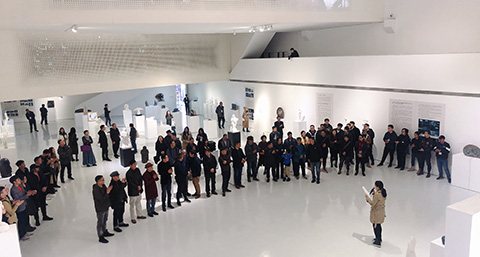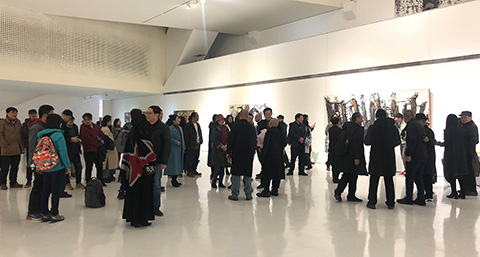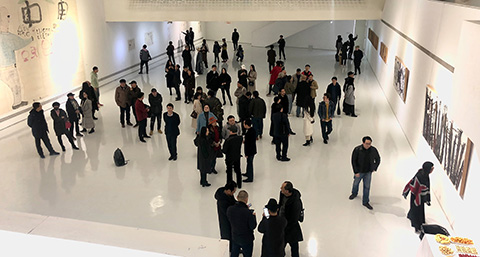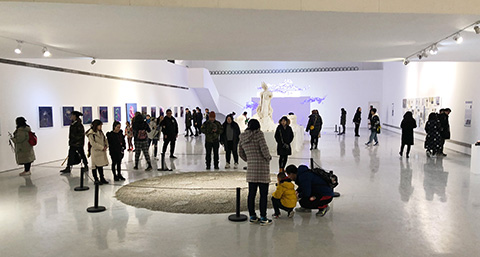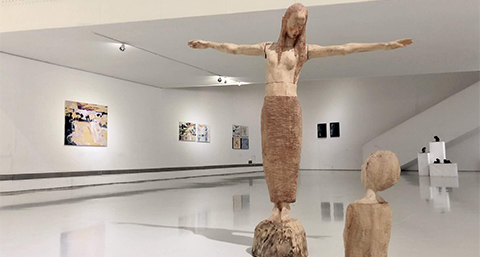- 悦 · 美术馆|《免疫·地理》Immunity Geography
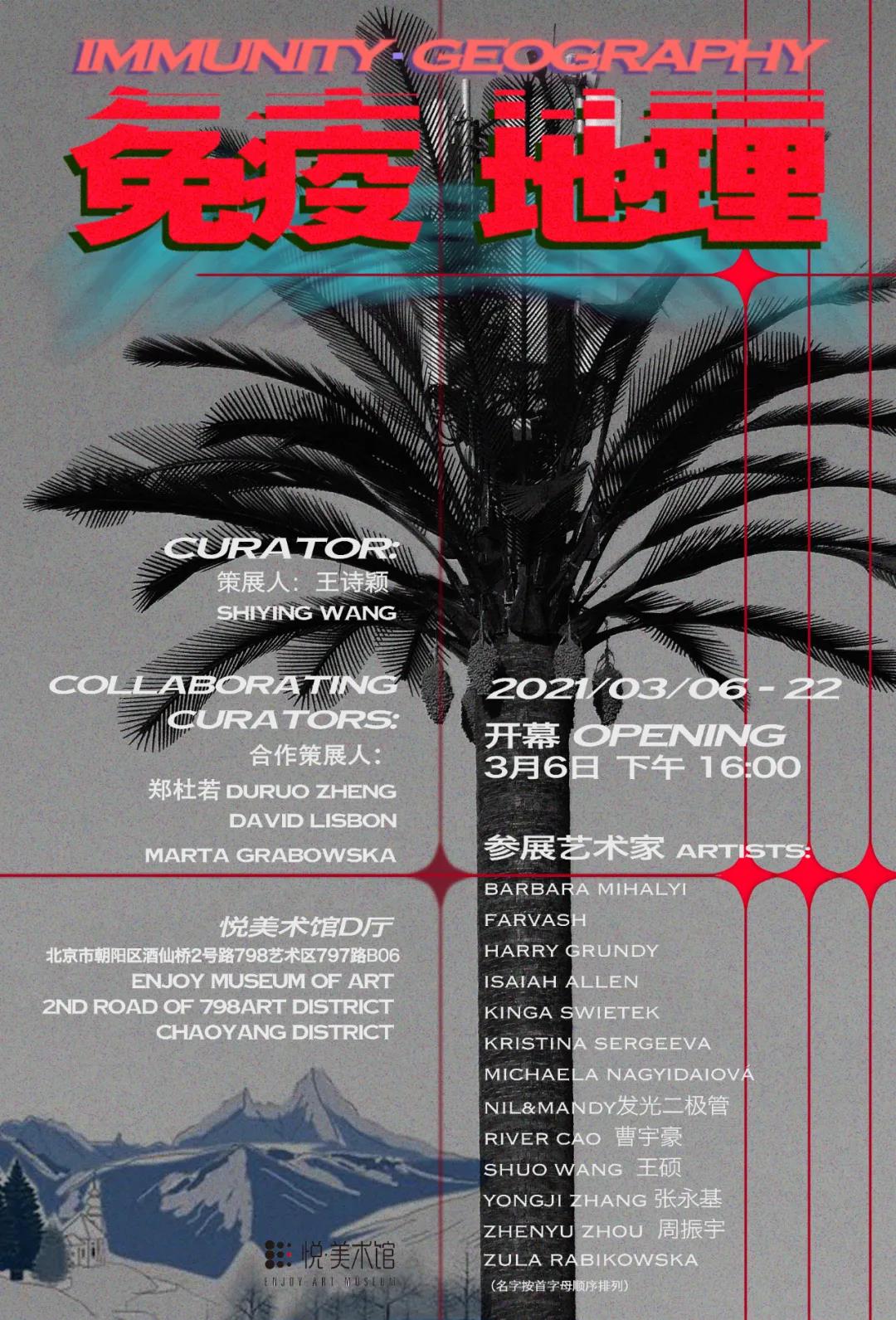
免疫·地理
Immunity Geography
主办方:悦·美术馆
策展人:王诗颖
Curated by Shiying Wang
合作策展人:郑杜若 大卫·里斯本 玛塔·格斯
In collborating with:Duruo Zheng David Lisbon Marta Grabowska
开幕时间 Opening:2021年3月6日 下午16:00
展览日期 Duration:2021年3月6日—22日
展览地点 Venue:北京 悦·美术馆 D 厅
北京市朝阳区酒仙桥2号路798艺术区797路B06
Add: B06 797 Road, 798Art Zone, No.2 Jiu Xianqiao Road, Chaoyang District, Beijing
参展艺术家
Barbara Mihalyi
Farvash Razavi
Harry Grundy
Isaiah Allen
Kinga Swietek
Kristina Sergeeva
Michaela Nagyidaiová
Nil&Mandy发光二极管
River Cao 曹宇豪
Shuo Wang 王硕
Yongji Zhang 张永基
Zhenyu Zhou 周振宇
Zula Rabikowska
(名字按首字母顺序排列)
“免疫·地理”试图反思在当前的气候下,身体与物体、自我与他人、 认同与非认同、存在与缺席的冲突。展览的空间被视为一座"通道",一个过渡转换和链接的空间。13位来自不同地理气候和文化环境的艺术家在几乎相似的身体经验下,在这一空间中同步开启一场文化地理差异中的对话。“免疫·地理”邀请观者注意从适应到栖息状态的转变,例如身体与符号的对抗,人类生存在自然和数字领域中的具体化和非实体化经验。
“大流行”将 “免疫力”重新置于聚光灯下,免疫伴随病毒而生,而具有“双栖”属性的病毒不再是单纯的自然风险。食品链的高度工业化破坏了区域环境下有机体的自然免疫力,导致致病菌种群的增长,而全球化跨区域的运输系统(例如冷链)进一步加剧了这种风险。因此,“免疫”不只是环境生物性的,也与地理、政治和技术紧密相连。
在生物学中,“免疫”被定义为对外部来源的一种抵抗反应,而免疫哲学常常把关于自我、身份和主权的主张自然化。德里达的“自我免疫”概念将免疫看作共同体针对自身的作用机制,而不是一种与外来敌对或者异质力量的对抗方式。其解释下的“免疫”与医学意义上的免疫截然相反,“自我免疫”建立了人类身体与身体政治的关系,却自然地具备解构这些关系的意义。唐娜·哈拉维将免疫系统视为毫无疑问的后现代物质,即一个编码系统。病毒成为信息故障或交流异常的碎片,一个误识或违反“自我”边界的过程,而现代免疫学则为西方生命政治辩证法中自我和他者之间的辨识与误识描绘了一张地图。由此,免疫学创造了一个令人激动的后现代身体,它重新唤醒了人类身份,书写一段新的建构。
在这里,我们讨论如何试图在“扩散”、“遮蔽”、“避免” 中进行艺术生产创作。此次讨论是在合作状态下进行,来自不同地域背景的艺术生产者将在内容和形式的相互影响之下进行拼贴对话。在展览的过程中,我们共同提出以下问题:身体、精神和数字(符号)能否协同工作?我们能在网上建立群体免疫吗?我们需要其他人和自然来生存吗?来自不同地理区域的艺术家如何应对全球免疫危机?
"Immunity·Geography" attempts to reflect on theconfrontations between bodies and objects, self and others, identification and disidentification, presence and absence in the current climate. The space which the exhibition occupies willbecome the "passage", a space of transition and connection. 13 artists from different geographical and culturalclimates with similar physical experience, are invited to conversation underdirect cultural and geographical differences. We would like to draw the audience's attention to the ideas of transition from the adaptation to inhabitation, such as the body versus the symbol, embodied and disembodiedexperience within the natural and the digital spheres of human existence.
The pandemic has put the spotlight on human immunity.Immunity is stimulated by viruses, and viruses with "amphibious"attributes are no longer a pure natural risk. The industrialization of variousprocesses, responsible for food manufacture and distribution, put a greatstrain on the immunity.Globalization and the trans-regionaltransportation system further exacerbates this risk. Therefore,"immunity" is not only an environmentally and biological concept butalso closely related to geography, politics, and technology.
According to its definition in biology, Immunity is aresistive reaction to external sources. Nevertheless, Immunology often hasserved to naturalise claims about self, identity, and sovereignty, mostprominently in Jacques Derrida’s writing Autoimmunity: Real and SymbolicSuicides, when he defines the autoimmunitary processes of democracy: “As weknow, an autoimmunitary process is that strange behavior where a living being,in quasi-suicidal fashion, ‘itself’ works to destroy its own protection, toimmunize itself against its ‘own’ immunity.” Derrida's exposition about"Immunity" is entirely different to its biological meaning, it refersto self-destroy in a political sense. “Autoimmunity” establishes relationshipsbetween the human body and body politics, but it is also introduced todeconstruct these relationships. Donna Haraway regards the Immune system as anunambiguous post-modern object , a coded system. The disease becomes "asubspecies of information malfunction or communications pathology", or"a process of misrecognition or transgression of the boundaries of astrategic assemblage called self". Modern Immunology draws a map forrecognition and misrecognition of self and others in the dialectics of WesternBiopolitics. Thus, for Donna Haraway, Immunology creates an exciting postmodernbody, it reawakens human identity and writes a new constitution.
In this exhibition, we discuss how to attempt to create artin the process of "diffusion", "concealment" and"avoidance". In the course of the exhibition we ask, inter alia, thefollowing questions: Can body, spirit, and the digital (symbol) live in synergy?Can we build herd-immunity online? Do we need others and nature to survive? Howdid artists coming from different geographic regions respond to the globalcrisis of immunity?
关于策展人 About Curator
王诗颖,独立策展人,实践合作式策展的不同模式与组织形式,强调跨区域与不同种类的合作,依靠互动性的实验拓展不同社区群体之间的连接关系。先后就读于中央美术学院设计学院与英国皇家艺术学院当代艺术策展专业(2020至今),曾就职中央美术学院公共教育部、中央美术学院对外教育交流中心,研究主要侧重于策展在知识生产过程中体现出的融合性和身份和意识形态介入艺术过程,通过对知识生产过程梳理来拓展策展概念的边界。
Wang Shiying, independent curator, practices with different modes and organisational forms of collborative curating, focus on cross-regional and different types of collaborations as well as interactive experiments on expanding the connection between different community groups. She studied at the Central Academy of Fine Arts in China and the Royal College of Art in London. Worked at the Department of Public Education of the Museum of Central Academy of Fine Arts, and the CAFA's Foreign Education Exchange Center. Her research mainly focuses on the integration, identity and ideology embodied in the knowledge production process of curatorial practices. Intervene in the artistic process and expand the boundaries of curatorial concepts by combing through the knowledge production process.
郑杜若,毕业于中央美术学院史论系和英国皇家艺术学院当代艺术策展专业(2020至今)。她的研究专注于策展在异性规范社会中与边缘艺术社群体的交错与回应,以及展览作为一种替代性叙述的可能性。
Duruo Zheng is a researcher and curator, graduated from Central Academy of Fine Arts and the Royal College of Art. Her research and practice focus on vulnerability and counter-normativity in human societies, and the possibilitiy of exhibition as an alternative narrative.
大卫·里斯本,是一位来自美国具有建筑学背景的策展人,他的实践兴趣集中于对数字化转型、 城市以及人类劳动与这些空间顺利运作的方式。现就读于英国皇家艺术学院(2020至今)。
David Lisbon is a curator with a background in architecture, his practice is interested in the digital transition, cities, and the way human labor is integral to these spaces working smoothly
玛塔·格布斯,是一位艺术史学家和独立策展人,拥有创意摄影的背景。在英国中央圣马丁学院学习了策展的基础知识后,她获得了英国伦敦大学伯克贝克艺术与策展史学士学位(2016),在那里她研究了慢艺术的理念。她共同创建了一个名为 ONE Project(2016) 的慢艺术平台和面向中东欧女性和非二元创意人士的姐妹会,促进文化理解,称为 Red Zenith Collection(2020)。也是英国ArtBLAB敦的联合创作者。
Marta Grabowska is an art historian and independent curator, with a background in creative photography. After learning the basics of curating at Central Saint Martins, UAL, she received her BA in History of Art and Curating from Birkbeck, University of London, where she researched ideas regarding Slow Art. She co-founded a Slow Art platform called ONE Project (2016) and sisterhood for Central and Eastern European women and non-binary creatives, promoting cultural understanding called Red Zenith Collective (2020). She is a co-creator at artBLAB London.

